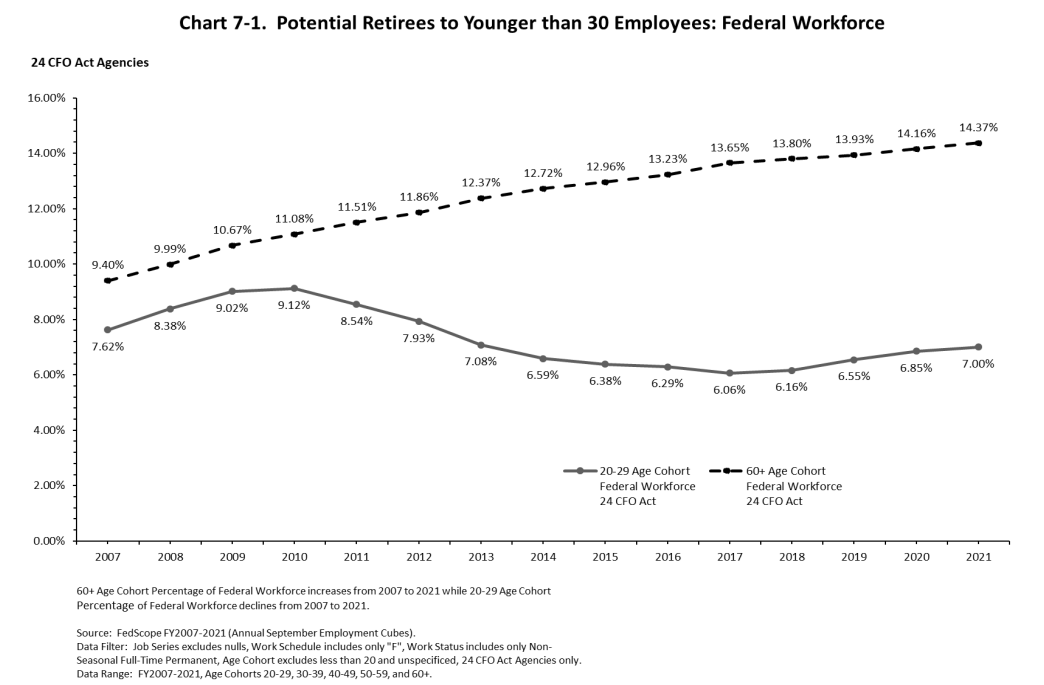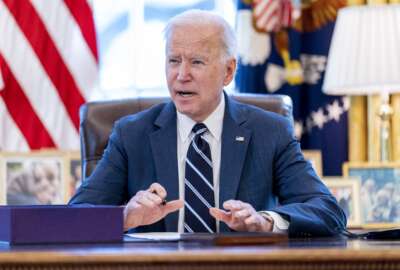Senate legislation seeks to expand early-career pipeline for federal service
The Senate’s Inspired to Serve Hiring Improvements Act would add flexibility for recruiting college graduates, along with lengthening temporary employee terms and...
Intent on lowering the average age of federal workers and expanding options for term appointments, Senate lawmakers presented hiring flexibilities for agency heads who want to recruit early-career and temporary employees.
The Inspired to Serve Hiring Improvements Act, introduced by Sens. James Lankford (R-Okla.) and Mike Braun (R-Ind.), increases the limit on appointments of recent college graduates and post-secondary students to try to solve the problem of an aging federal workforce.
The legislation, introduced in Senate Homeland Security and Governmental Affairs Committee on April 7, raises the number of hires made using expedited hiring authority to 25%, up from the current 15% level.
At an HSGAC hearing on March 2 for the Subcommittee on Government Operations and Border Management, President and Chief Executive Officer for the National Academy of Public Administration Terry Gerton said that recruiting young people is critical for the government over the next few years.
“At the time when the government needs fresh ideas, it struggles to hire young people. With twice as many employees over 60 years old as under 30, the federal government will face future workforce issues,” Gerton said.
The Office of Management and Budget reported similar findings as part of President Joe Biden’s fiscal 2023 budget request, in the analytical perspectives section. For 2021, OMB’s data showed that 14.37% of the federal workforce was over 60, while just 7% was between 20 and 29 years old.

Additionally, the average age of federal workers has remained flat for the last five years, at approximately 47 years old.

The bill’s focus in part on hiring early-career workers is important given the rising number of federal employees hitting retirement age, as well as the lengthy process to get new federal hires in the door, Lankford said.
“We are at a critical point,” Lankford said at the March 2 HSGAC subcommittee hearing on improving federal human resources practices.
“We have quite a few federal employees that are eligible for retirement. It continues to drag on and on with the hiring and the length of time it takes to hire. The latest numbers that we have is now 92 days to be able to get to a hire,” Lankford said.
Creating more options for temporary, term appointments
Making temporary and term appointments more flexible is another goal of the legislation, which it aims to accomplish by extending how long employees can serve in those types of appointments.
For temporary appointments, employees can currently serve up to one year. Under the legislation, agency heads can lengthen that term by one year at a time, for a total of up to three years.
The act also gives agency heads the option to extend term appointments that are fewer than six years long. The extensions can increase incrementally up to a total of six years in service under the bill. Typically, those appointments are between one and 10 years long.
Additionally, the bill provides direct hire authority to agency leaders when there is a shortage of highly qualified candidates. That contrasts with the current rule, which only allows for that authority when there is a severe shortage of candidates. Lankford and Braun said that this broader authority already exists at the Department of Veterans Affairs, and the bill would extend it to all federal agencies.
Lankford said the changes in the Inspired to Serve Hiring Improvements Act address hiring challenges that many agencies face. In particular, the long process to hire workers to federal positions makes it more difficult to recruit high-quality candidates.
“With so many federal employees eligible for retirement, we need to ensure the federal workforce is equipped and prepared to hire and train employees in the days ahead,” Lankford said in a press release. “This is a fix that will not only ease the frustration of federal hiring but will save taxpayer dollars and ensure high-quality service to Americans.”
The legislation stems from recommendations on hiring reform in a report called “Inspired to Serve” by the National Commission on Military, National and Public Service.
“Existing practices block younger Americans and workers with critical skills from entering public service and jeopardize the ability of federal agencies to replenish their workforce in the face of a looming wave of retirements,” the report stated.
Biden administration, House lawmakers push hiring reforms
Similar efforts for the government to hire early-career workers and recent college graduates come from the White House.
President Joe Biden’s 2023 budget request addressed the increasing struggles to recruit for federal positions as more employees hit retirement age. The Biden administration reported that 15% of federal employees are eligible to retire today. That will increase to 30% in the next five years.
“Replacing the valuable contributions and skillsets of retiring public servants will be a challenge, given the competitive U.S. labor market. Coupled with longstanding, additional challenges stemming from a fragmented hiring process — challenges that have become further complicated and cumbersome for applicants and agencies alike — agencies face obstacles as they seek to recruit, hire, engage and retain early career talent in particular in high-demand career fields, and in certain geographic areas,” the administration stated in the analytical perspectives section of the budget request.
The Biden administration’s budget request extends the number of internships for agencies to 30,000 for next year. Additionally, the request expands on the use of federal agency talent teams to improve the hiring process.
The legislation also comes as lawmakers in both the House and the Senate push for other types of federal hiring reforms.
In the Chance to Compete Act, which the House Committee on Oversight and Reform passed on April 6, House lawmakers aim to incorporate more subject matter experts in federal hiring practices. Along with that, the bill increases focus on skills-based attributes for candidates, rather than applicants’ educational backgrounds.
The Senate’s Homeland Security and Governmental Affairs Committee passed its version of the Chance to Compete Act in February, which Lankford co-sponsored.
In another effort to reform federal recruitment, Lankford helped work on legislation about increasing overtime pay for Border Patrol agents last month. That came in response to critically low staffing numbers at the Customs and Border Protection. The legislators who introduced the bill, including Lankford, said providing equal pay to Border Patrol agents would strengthen retention for the service.
At the HSGAC subcommittee hearing on March 2, former Acting Director at the Office of Personnel Management Michael Rigas said the government continues to fall short when it comes to recruitment and retention, but that the efforts underway show promise.
“I am encouraged by the bipartisan legislation you have sponsored in the Chance to Compete Act, which codifies many of these reforms to improve federal hiring and personnel practices,” Rigas said.
Copyright © 2025 Federal News Network. All rights reserved. This website is not intended for users located within the European Economic Area.
Drew Friedman is a workforce, pay and benefits reporter for Federal News Network.
Follow @dfriedmanWFED






